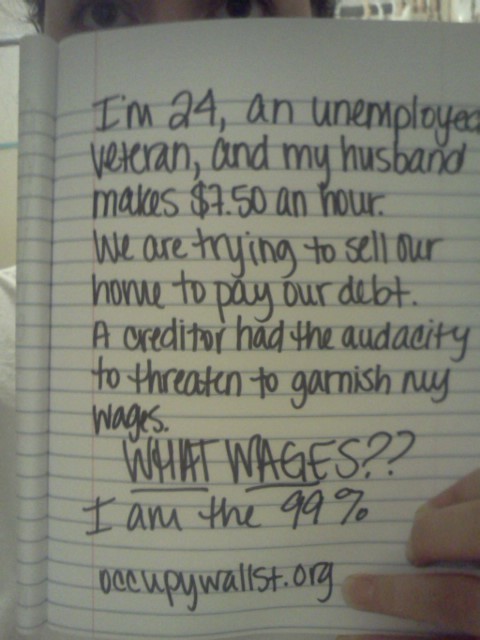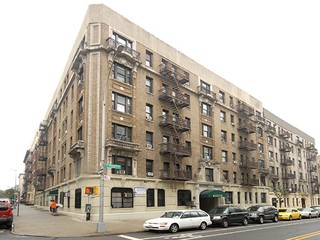The con game reshuffle!!! Watch out for what is to come
Queens Vantage Tenants Council
"As an anonymous participant in financial markets, I never had to weigh the social consequences of my actions...I felt justified in ignoring them on the grounds that I was playing by the rules".
Monday, January 2, 2012
Friday, September 30, 2011
Thursday, September 29, 2011
Predation
Predatory Equity is a phenomenon whereby private equity investors acquire and substantially over leverage rent restricted housing for the explicit purpose of removing regulation, raising rents, and displacing low and moderate income families. With the recent financial crisis, investors have been unable to realize their anticipated returns. As a result, many buildings have fallen into foreclosure and serious disrepair. The Organizing and Policy Department is at the forefront of innovative policy solutions which fight Predatory Equity and lead to opportunities for the preservation and recapture of this housing stock as affordable. This is primarily done through transfers to tenants and tenant endorsed non-profit housing providers.http://www.uhab.org/programs/organizing
Wednesday, September 28, 2011
Tuesday, August 30, 2011
Wednesday, August 10, 2011
Tuesday, August 9, 2011
Thursday, March 3, 2011
Contact us
Are you interested in becoming a leader of your building? Network with other tenants of Vantage owned buildings? Does your building and/or apartment need repairs? Are you being harassed? Then E-mail the Queens Vantage Tenants Council with your questions and / or inquiries with a telephone contact and building address to
qvtchelp@gmail.com
Tweet
Wednesday, March 2, 2011
Friday, October 1, 2010
Vantage just doesn't seem to care about how tenants get in and out of their buildings. This condition has existed, according to tenants, since Vantage began manageing the properties in 2008.
if (WIDGETBOX) WIDGETBOX.renderWidget('c560bb3d-3bf8-4f68-a146-51dc30e999cd');
New York's Ten Worst Landlords, Part 1
Friday, August 20, 2010
Wall Street Journal reports on Vantage Properties financial problems
Cuomo to Sue Vantage Properties for Harassment
Landlord Faces Lawsuit for Harassment
Friday, February 12, 2010
ATTORNEY GENERAL CUOMO ANNOUNCES $1 MILLION SETTLEMENT WITH NEW YORK CITY LANDLORD “VANTAGE PROPERTIES” TO STOP TENANT HARASSMENT
Tuesday, February 2, 2010
Friday, January 29, 2010
Cuomo plans to sue landlord Vantage
Sunday, January 17, 2010
Hamilton Heights Tenants Sue Vantage Properties
Monday, November 2, 2009
Daily News highlights tenants demand for supers in our buildings
Friday, October 16, 2009
Queens Vantage Tenants Council Demands given to Neil L. Rubler
Queens Vantage Tenants Council Demands
The QVTC demands that
1.) Vantage’s Long Island City office be open until 8pm Monday through Friday and from 9am to 5pm every Saturday and staffed with multilingual representatives who can respond to tenant complaints at such times; and
2.) Vantage sets up temporary offices in certain of the centrally located buildings on a biweekly basis where tenants can communicate with a multilingual representative to resolve false billing, repair requests and other issues; and
3.) Vantage must permit tenants to tender rent personally in Vantage’s office and issue tenants a rent receipt with date and time when tenants pay their rent in this way; and
4.) Any rent bill which indicates a “previous balance forward” will enclose a copy of the tenant’s “resident ledger” in order to provide the tenant with an explanation or breakdown of the alleged arrears; and
5.) Every tenant who makes a complaint in person regarding false billing, repairs or other issue be given a written receipt with a tracking number; and
6.) Every tenant who makes a complaint of false billing receive a written response within 7 business days and such response will either acknowledge Vantage’s error and confirm correction of the tenant’s account or provide a detailed statement of what evidence (i.e. proof of payment) Vantage requires in order to remove the arrears charge; and
7.) Vantage must stop issuing late fees until such time as the current pattern of false billing is resolved; and
8.) In every instance where Vantage acknowledges that a tenant received a false allegation of arrears, the tenant receive a rent credit of $50; and
9.) All communications with Vantage via the 1-800 number be documented and that a complaint number be issue to calling tenants; and
10.) Vantage must respond to repair requests within 48 hours; and
11.) Vantage must also ensure that at all times, a person answers the phone and that tenants will never be directed to leave messages in a non-functioning voice mail service; and
12.) In all communications between the company and tenants, Vantage must ensure multilingual access (i.e. English, Spanish, Bengali, Korean) to tenants; and
13.) Vantage must authorize the superintendents in the buildings to take complaints and requests for repairs. These must be documented with a receipt, a copy of which shall be given to the tenant asking for repairs. Receipts must include a tracking number; and
14.) Within 10 days of this meeting, Vantage must give us a list of all buildings that do not have a full time superintendent living within 200 feet or 2 blocks. Vantage must also comply with hiring supers in those buildings immediately; and
15.) Vantage must notify the tenants of any MCI’s planned for the buildings at least 6 months prior to doing the job, and they shall also post it in the lobby of the buildings; and
16.) Vantage must also make itself available to tenants via e-mail, and establish a website with public information where tenants can track complaints. The site may also contain tenants’ accounts; and
17.) Vantage must send a copy of completed leases signed by both parties back to the tenants on time and as stipulated by law; and
18.) Vantage must also provide tenants with access to bulletin boards in the buildings to post public information; and
19.) In relation to both false billing and repairs, we demand that Vantage and its investors provide the QVTC with a report every 3 months for the next 18 months, detailing the following:
a. the number of false billing complaints received
b. the number of repairs requests received
c. the number of false billing complaints which result in admission of error
d. the number of complaints received from tenants who report that Vantage missed a scheduled repair appointmentTweet
The QVTC demands that
1.) Vantage’s Long Island City office be open until 8pm Monday through Friday and from 9am to 5pm every Saturday and staffed with multilingual representatives who can respond to tenant complaints at such times; and
2.) Vantage sets up temporary offices in certain of the centrally located buildings on a biweekly basis where tenants can communicate with a multilingual representative to resolve false billing, repair requests and other issues; and
3.) Vantage must permit tenants to tender rent personally in Vantage’s office and issue tenants a rent receipt with date and time when tenants pay their rent in this way; and
4.) Any rent bill which indicates a “previous balance forward” will enclose a copy of the tenant’s “resident ledger” in order to provide the tenant with an explanation or breakdown of the alleged arrears; and
5.) Every tenant who makes a complaint in person regarding false billing, repairs or other issue be given a written receipt with a tracking number; and
6.) Every tenant who makes a complaint of false billing receive a written response within 7 business days and such response will either acknowledge Vantage’s error and confirm correction of the tenant’s account or provide a detailed statement of what evidence (i.e. proof of payment) Vantage requires in order to remove the arrears charge; and
7.) Vantage must stop issuing late fees until such time as the current pattern of false billing is resolved; and
8.) In every instance where Vantage acknowledges that a tenant received a false allegation of arrears, the tenant receive a rent credit of $50; and
9.) All communications with Vantage via the 1-800 number be documented and that a complaint number be issue to calling tenants; and
10.) Vantage must respond to repair requests within 48 hours; and
11.) Vantage must also ensure that at all times, a person answers the phone and that tenants will never be directed to leave messages in a non-functioning voice mail service; and
12.) In all communications between the company and tenants, Vantage must ensure multilingual access (i.e. English, Spanish, Bengali, Korean) to tenants; and
13.) Vantage must authorize the superintendents in the buildings to take complaints and requests for repairs. These must be documented with a receipt, a copy of which shall be given to the tenant asking for repairs. Receipts must include a tracking number; and
14.) Within 10 days of this meeting, Vantage must give us a list of all buildings that do not have a full time superintendent living within 200 feet or 2 blocks. Vantage must also comply with hiring supers in those buildings immediately; and
15.) Vantage must notify the tenants of any MCI’s planned for the buildings at least 6 months prior to doing the job, and they shall also post it in the lobby of the buildings; and
16.) Vantage must also make itself available to tenants via e-mail, and establish a website with public information where tenants can track complaints. The site may also contain tenants’ accounts; and
17.) Vantage must send a copy of completed leases signed by both parties back to the tenants on time and as stipulated by law; and
18.) Vantage must also provide tenants with access to bulletin boards in the buildings to post public information; and
19.) In relation to both false billing and repairs, we demand that Vantage and its investors provide the QVTC with a report every 3 months for the next 18 months, detailing the following:
a. the number of false billing complaints received
b. the number of repairs requests received
c. the number of false billing complaints which result in admission of error
d. the number of complaints received from tenants who report that Vantage missed a scheduled repair appointmentTweet
Sunday, June 7, 2009
FRAUD, MISCONDUCT AND RENT GOUGING IN NEW YORK CITY

New tenants need to know about this tactic of predatory equity companies like Vantage Properties, LLC. Shabby work by non union labor and the use of building materials whose quality is of questionable content. You have a right to question the landlord's accounting method that came up with your rent. Are you being gouged?
Tweet
Tuesday, December 16, 2008
Fired-up Vantage tenants stage rally in Columbus circle
Tenants say owner Vantage Properties ignores pleas, yet still renovates
Friday, July 25, 2008
Catholic Migration Office, Daily News help fulfill Queens woman's dying wish
Saturday, June 7, 2008
Queens Tribune Editorializes against Vantage

Popular Queens weekly newspaper Queens Tribune, has an editorial on Vantage Properties, LLC. see exactly, what predatory equity is all about.Tweet
Saturday, May 24, 2008
NY Times exposes Vantage Properties
Tuesday, May 20, 2008
Wall Street Takes Dead Aim at Affordable Housing in New York City
Monday, May 19, 2008
Do CBS employees live in Vantage buildings? hmm
Saturday, May 17, 2008
New York Times looks at Vantage



Investment funds accused of intimidating New York tenants
By Gretchen Morgenson
Friday, May 9, 2008
NEW YORK: Private investment firms have been amassing what may seem like unusual stakes in New York real estate: They have bought hundreds of apartment buildings with thousands of rent-regulated units across the city that produce meager returns.
As regulatory filings and promotional materials show, the companies expect to generate higher returns quickly by increasing rents after existing tenants vacate their units. Their success depends upon far higher vacancy rates than are typical in rent-regulated apartments in New York.
Some residents and tenant advocates say that they began seeing what they consider a pattern of harassment of low-income tenants this year and suspect that it is a result of the new owners' business models.
Tenants have been sued repeatedly for unpaid rent that has already been received by the landlords; they have been sent false notices of rent bills, lease terminations and nonrenewals; and they have been accused of illegal sublets.
Tenants must answer these notices in court, but many have responded by moving out, court documents indicate. When they vacate the apartments, the owners can increase the rents substantially.
"Predatory equity is undermining the best efforts of New York City and state elected officials to slow the loss of affordable housing," said Benjamin Dulchin, deputy director of the Association for Neighborhood and Housing Development, a nonprofit organization. "Both the private equity funders and the lending institutions are aware, or should be aware, that harassment of tenants is taking place as a result of their financial models."
Private investment funds have boomed in recent years, buying companies they considered undervalued in industries as diverse as communications, hotels and energy, streamlining operations and then selling them at a profit. For example, private equity firms have bought nursing homes, often sharply reducing expenses and cutting staff to increase their profit.
New York provides an unusual opportunity because it is one of the few American cities with a large inventory of apartments whose rental rates are regulated and kept below market levels.
In the past four years, developers backed by private equity firms have acquired almost 75,000 rent-regulated apartments, Dulchin said, or about 6 percent of the 1.2 million such units in New York. Major private equity-backed participants in this market include Vantage Properties, which has formed a partnership with Apollo Real Estate Advisors; the Pinnacle Group, a unit of Praedium Capital; and Normandy Real Estate Partners.
These companies often make clear that raising rents is crucial to their financial goals. On its Web site, Normandy Partners notes "the increased institutional appetite for New York City rent-stabilized housing transactions" and adds: "There is a near-term opportunity to increase cash flow by converting rent-stabilized apartments to market rate as tenants vacate units."
The companies say that they are not harassing tenants and that they are only trying to protect their rights by enforcing legitimate rules governing regulated apartments.
But the New York City Rent Guidelines Board says the vacancy rate on rent-regulated apartments is 5.6 percent each year. Buildings with vacancy rates far higher suggest resident harassment, tenant advocates say.
Vacancy rates have risen above 20 percent in some buildings owned by Vantage Properties; in some Normandy buildings, the rates exceed 30 percent.
If an apartment is rent-regulated, yearly increases cannot exceed the amount set annually by the Guidelines Board. Most recently, it was 3 percent on a one-year renewal lease.
When an apartment becomes vacant, rents can climb as much as 20 percent. When that rent rises above $2,000, regulations no longer apply, and tenants must pay market prices.
Tenant advocates say that property managers, in order to generate returns expected by private equity investors and to pay off the debt used for their purchases, are intimidating residents in the hopes of pushing them to leave so that rents can be raised. Rent-regulated apartments comprise 57 percent of the total in the Bronx, 42 percent of the apartments in Brooklyn, 59 percent in Manhattan, 43 percent in Queens and 15 percent of those on Staten Island, the Guidelines Board says.
Vantage Properties, led by Neil Rubler, has paid more than $1 billion in the last two years to buy 9,200 rent-regulated apartments. Investing alongside Vantage in many buildings is Apollo Real Estate Partners, an investment firm founded by William Mack in partnership with Apollo Management, a private equity firm created by Leon Black, a former Drexel Burnham Lambert banker and acolyte of Michael Milken.
In April, Black announced a plan to sell $500 million worth of Apollo Management shares to the public. Apollo Real Estate Partners will not be part of that sale. A spokesman for Black said it was a separate company in which he had a stake but exercised no control over it.
In a group of buildings with 2,124 apartments, Vantage has filed almost a thousand cases in housing court against tenants since October 2006, according to Robert McCreanor, director of legal services at the Immigrant Tenant Advocacy Project of the Catholic Migration Office in New York.
McCreanor said he searched public records for similar actions by the previous landlord. He found no more than 350 in any year.
"What's offensive about these business practices is they seek to generate above-average profits by displacing poor people and people who are vulnerable," McCreanor said.
A spokeswoman for Apollo Real Estate said the company would not comment on the harassment accusations. But Rubler called them baseless. "Any exploration of the way we conduct business would reveal that we are steadfastly determined to uphold the rights of our residents and have absolutely no interest in harassing them," he said. "They are our valued customers, and we treat them as such."
Rubler said most of his tenants had positive experiences. Claudia Williams, of Corona, Queens, was asked by Rubler to talk with a reporter. She said that Vantage was allowing her to live in her mother's apartment even though she was not the primary leaseholder.
Phyllis Miller, a resident of Savoy Park in Upper Manhattan, said she believed that tenants who were unhappy with Vantage simply disliked change.
But Jose Ricardo Aguaiza, 45, who works as a doorman in Manhattan, said he had lived in the same Woodside, Queens, apartment for 14 years and had never had a problem until Vantage took over in 2006. Since July 2007, Aguaiza has been sued by Vantage three times, twice for nonpayment of rent that he was able to demonstrate the company had in fact received.
"They refused to give me a renewal contract," Aguaiza said. "And in court, the lawyer from Vantage offered to give me three months' free rent for moving out." Aguaiza said he turned down the offer.
On April 10, Aguaiza and five other rent-stabilized tenants living in the Woodside, Jackson Heights and Sunnyside neighborhoods of Queens sued Vantage. The plaintiffs say the company has engaged in deceptive practices that violate New York's consumer protection laws. Five more tenants are joining the suit.
Subscribe to:
Comments (Atom)
















